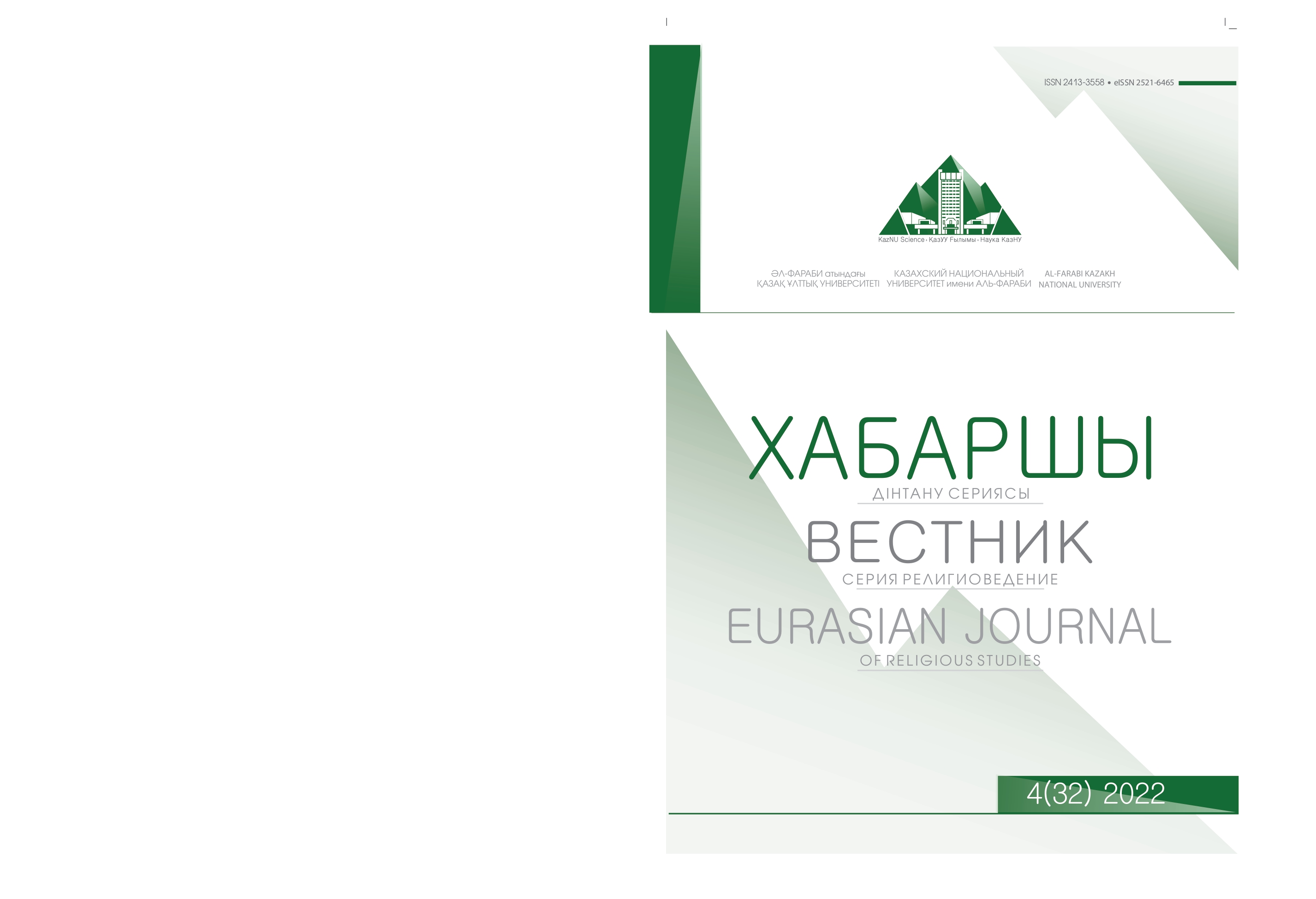The Concept of a Noble and a Perfect Person in Religious Philosophy
DOI:
https://doi.org/10.26577//EJRS.2022.v32.i4.r5Keywords:
Noble Person, Perfect Person, Being, Humanity, SufismAbstract
The formation of a noble and perfect person is the basis of social development. The ideas of nobility and perfection have evolved historically alongside human development. In the era of modern global processes and the fall of values, the concept of a noble and perfect person in religious philosophy does not lose its relevance. This article’s goal is to make clear the significance and essential characteristics of a noble and perfect person in religious philosophy. This article is based on the findings of numerous scientists who have investigated the issues raised by these concepts. The significance of comprehending the idea of a noble and perfect person from a theoretical standpoint is discussed in the article. We shall address each of these subjects in turn. First of all, we define the characteristics of a noble person and the role of Confucianism in defining the concept. The study revealed that a noble person should be an independent, moral, and unique individual. The primary features of a perfect person are then defined. It has been established that the perfect person is exemplary and distinguishable by ideality. Comparative analysis was used to study the scientific literature and produce the results. A descriptive approach was used to emphasize content analysis as well as systemic and historical research techniques. The article’s authors got to the conclusion that there are differences between what is meant by a noble person and what is meant by a perfect person.
Key words: noble person, perfect person, being, humanity, Sufism.
References
Ahmad, S.N. (2014) “Between spiritual authority and temporal power: Ibn Khaldun’s views on Sufism.” Al-Shajarah, 19(1), 55-84.
Ahn, H. (2008) “Junzi as a tragic person: A self psychological interpretation of the analects.” Pastoral Psychology, 57(1-2), 101-113.
Aminzadeh, S. (2014) “Study of perfect man in Sanai’s Masnawis.” Advances in Environmental Biology, 8(11 SPEC. ISSUE 5), 249-252.
Bartkus, R. (2021) “Joking: Wit or ridicule?” Logos-Vilnius, 107, 64-73.
Birkvad, S. (2015) “The fall of perfect man.” Short Film Studies, 5(2), 145-148.
Boros, G. (2009) “Molière, descartes, générosité.” Filozofia, 64(2), 133-143.
Cynarski, W.J. (2016) “A Christian and the martial arts path.” Ido Movement for Culture, 16(2), 1-7.
Dar, B.A. (2011) “Iqbal and Nietzsche’s concept of eternal recurrence.” Intellectual Discourse, 19(2), 281-305.
Hung, R. (2016) “A critique of Confucian learning: On learners and knowledge.” Educational Philosophy and Theory, 48(1), 85-96.
Khalilova, N.I, Bafayev, M.M, Oribboyeva, D.D., & Alimjan Kizi, T.G. (2020) “Eastern thinkers about the phenomena of self-awareness.” Journal of Critical Reviews, 7(2), 254-256.
Kim, H.P. (2006) “Confucius’s aesthetic concept of noble man: Beyond moralism.” Asian Philosophy, 16(2), 111-121.
Landsman, T. (1968) Positive experience and the beautiful person. – Charleston: Southeastern Psychological Association. – 28 p.
Landsman, T., & Landsman, M.S. (1991) “The beautiful and noble person - an existentialist-phenomenological view of optimal human functioning.” Journal of Social Behavior and Personality, 6(5), 61-74.
Mackey, S. (2012) “Semiotic, rhetoric and democracy.” Cosmos and History, 8(1), 304-322.
Molotova, G.M., & Molotova, E.M. (2020) “The concept of “insan-i kamil” in the teaching of Sufi.” Voprosy Istorii, 2020(10-4), 206-215.
Moradi, H. (2015) “The ethics of the perfect man: Maurice Blanchot and Ibn ͑Arabi.” Journal of Shi’a Islamic Studies, 8(1), 61-80.
Nelson, E.S. (2013) “The question of resentment in Nietzsche and Confucian ethics.” Taiwan Journal of East Asian Studies, 10(1), 17-51.
Olmsted, W. (2013) “Ethical deliberation in Aristotle’s rhetoric and Nicomachean ethics.” Polis (United Kingdom), 30(2), 251-273.
Omelchuk, R.K. (2013) “Religious and political philosophy of the social education in Ancient China.” Journal of Siberian Federal University. Humanities & Social Sciences, 6(3), 357-368.
Özkan, F.H. (2011) “Four paths forty posts in collected poems of Eşrefoǧlu Rûmî.” Turk Kulturu ve Haci Bektas Veli - Arastirma Dergisi, 59, 253-278.
Shukurov, S. (2019) “The perfect man - From metaanthropology to Homo socialis.” Istoriya, 10(4).
Snell, R.S., Wu, C.X., & Lei, H.W. (2022) “Junzi virtues: a Confucian foundation for harmony within organizations.” Asian Journal of Business Ethics, 11(1), 183-226.
Sobel, J.H. (2017) “The need for coercion.” In Coercion, edited by J.R. Pennock and J.W. Chapman. - New York: Routledge. - 340 р.
Sumanta (2021) “The values of perfect human beings in the dignity seven of Insān Kāmil.” Journal of Social Studies Education Research, 12(4), 286-301.
Tan, C. (2012) “Our shared values” in Singapore: A Confucian perspective.” Educational Theory, 62(4), 449-463.
Tian, V.-I., Tang, F., & Tse, A.C.B. (2022) “Understanding corporate culture and business performance from a Confucian perspective.” Asia Pacific Journal of Marketing and Logistics, 34(4), 759-777.
Turan, A.Z. (2013) “Design as enclosure: Draft of a phenomenology of artifice.” Technoetic Arts, 11(2), 173-183.
Zhaparova, A.Z., Dadebaev, Z., & Zhaksylykov, A. (2016) “The conceptual metaphor in Abay Kunanbayev’s poetics.” Journal of Language and Literature, 7(3), 54-59.













